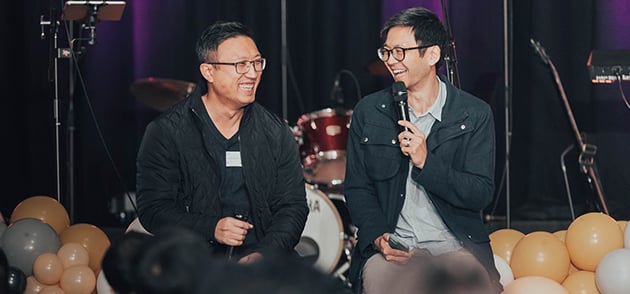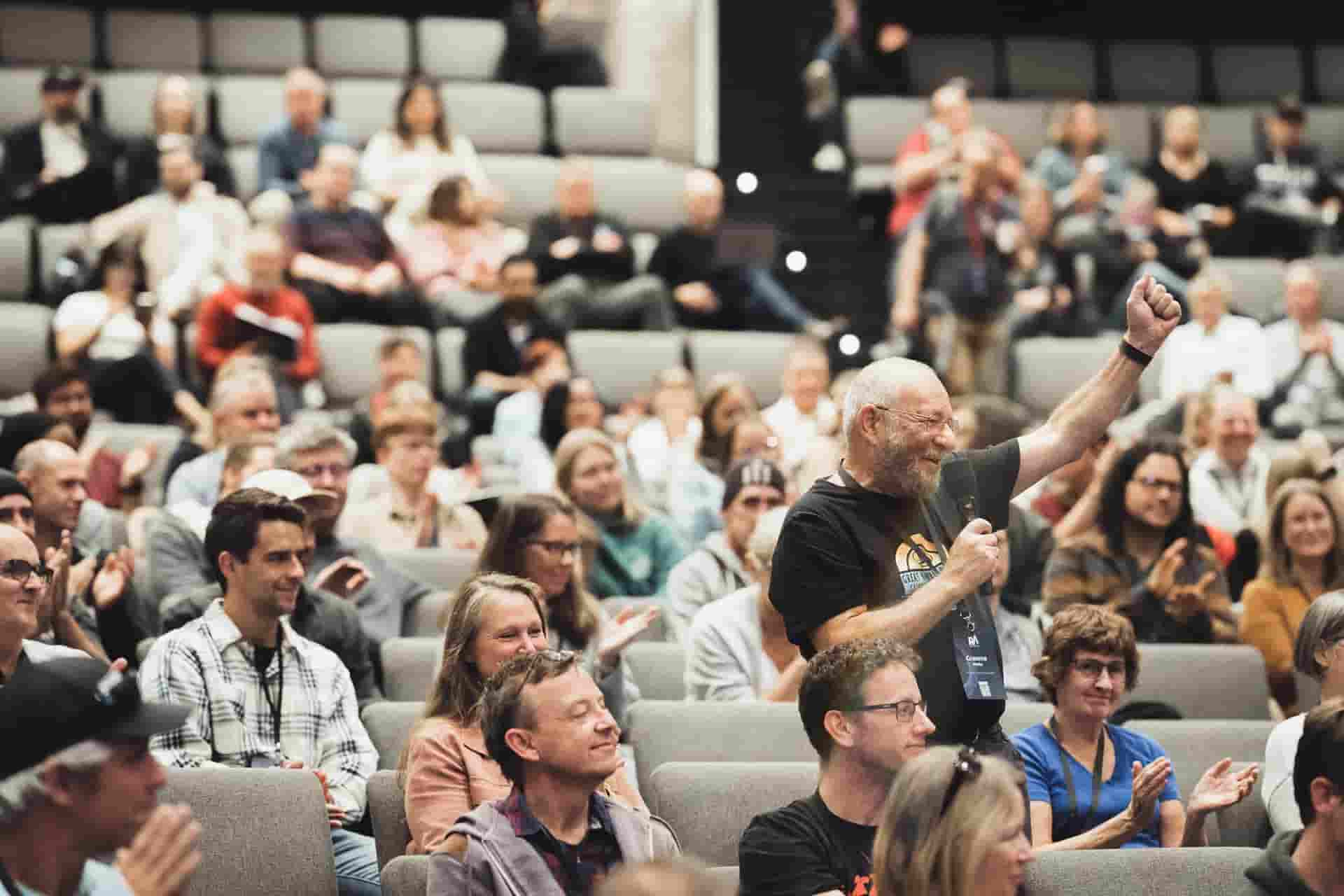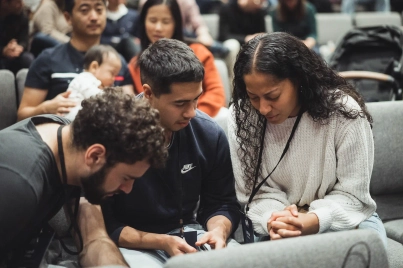At the time of recording, the Reach Australia National Conference was well under way. Scott chats with Murray Capill about the 4 chambers of the heart.
The resources, including Murray’s talk, and the link to the Gospel Coalition Article will be up online soon!!
TOOL BOX:
CREDITS:
The One Thing is brought to you by Reach Australia.
For ideas or questions please email [email protected]
To support the Reach Australia Online Library head here.
TRANSCRIPT:
The following is an uncorrected transcript generated by a transcription service. Before quoting in print, please check the corresponding audio for accuracy.
Good day. I’m Scott Sanders.
Welcome to The One Thing. A podcast designer give you one solid practical tip for Gospel Centre Ministry. Every week the One Thing is brought to you by Reach Australia and we wanna see thousands of healthy, evangelistic multiplying churches.
We are coming to you live from the 2024 Reach Australia National Conference and I have with me one of the speakers from the conference, Murray Cable.
Murray, welcome to the One Thing.
Yeah.
Thanks, Scott.
Great to be with you and it’s been great to be at the conference.
Now talk to us about your household.
What does family life look like in the capable household at the moment?
Though we are now officially empty nesters married to Wendy.
We’ve been married.
I think it’s 37 years.
We had five kids, they’re all married.
Four of them lived locally, one in Tazzy, and we’ve got a bunch of grandkids, 9 grandkids at last count.
So.
Can I ask, are you busier than when you’re a parent, as a grandparent or?
In a way, it’s different because you used to catch up with everyone around the dinner table every night, and now it’s all different appointments and times to catch up and the grandkids come over.
It’s a heap of fun, but it is actually quite a lot of time.
Now your day job is lecturing at the Reform Theological College in Melbourne.
Yeah, that’s right.
What are?
You What are you like?
What’s your favourite subject to teach on?
Probably my baby is training.
Preachers just love the preaching class.
Constantly have a cohort of preachers that I’m working with, but I also teach the other practical ministry subjects.
So pastoral care, leadership worship, ordained ministry subjects.
A whole bunch of stuff.
Well, you’ve been talking to us about the four chambers of the heart, mind will, conscience, passions.
Could you give us a bit of the rationale for that as a framework?
And how is it that actually landed there?
I first went there by listening to other preachers.
Martin Lloyd Jones was hugely influential on me.
Early on, he talked about that stuff a lot.
Then I backtracked from Lloyd Jones to Spurgeon and Ryle and backtrack from them to the Puritans, and did some study in Richard Baxter.
And that was where I really formulated and understanding of the heart has been these 4 faculties.
So, So they were talking.
Richard Baxter was talking about it in this way.
Or you picked it up in how he talked about preaching, how he how he thought about seeing people transformed and changed by the preaching of the Word.
Yeah, he’s constantly talking about the heart, and rightly so, because the heart is just a massive theme in Scripture.
And so through the Puritans, I was forced to think, well, what is the hat like?
What are we even talking about?
And it’s very much, I think, the centre soul, the very core of who we are as a person.
What does that mean?
He would open it up.
And I think, I think there’s really strong scriptural evidence that it sounded right.
It’s a yeah, right at the heart of who you are and how you think your your mind.
You’re thinking is core to who you are, right?
Thinking actually gets pressed on your conscience.
But deep inner sense of whether I’m right or wrong, good or bad, true or false.
There’s this internal ticket, internal judge of how we’re tracking.
He saw that as a key part of the centre of our being.
Both those things help generate our choices, our decisions, what we actually do.
That’s the will.
But I got the idea of, you know, I, I might be cute little hat diagram with the passions of the bottom.
He would have called them the affections, but he actually said the affections of the bottom of the soul or the bottom of the heart.
He saw it as the deepest part of our being.
So for those of you who are listening and and sort of thinking how do I picture this will put in the show notes, a picture of Murray’s slide where it actually breaks up the heart into these these 4 chambers.
What’s been really, you know great about this conference is that we have I guess had had your approach and also we’ve heard from Ray Ray Gallery in the evening as well Very there’s there’s a lot of similarity between how you and Ray are conceiving of this.
But notice Ray didn’t include the conscience.
Could you give a give us, I guess, more of your your thinking as to why including conscience is so important in your framework of the heart?
Yeah, I think as he talked about Mind and Will, he actually did conscience stuff.
It’s useful though, I think, to see it as a distinct category within our heart, because the stuff that we know with our mind is to be tested in the reality of our hearts.
And the conscience is this faculty of the heart that that discerns right or wrong.
It makes me feel guilty or at peace.
And there’s like this internal ticker that all keeps talking about.
He talks about ministering with a clear conscience.
He says my conscience is clear, but that doesn’t really matter because it’s actually what God thinks.
He talks about people having a seared conscience, so he’s constantly talking about this thing that even though you know stuff, how does that play out in your own heart experience.
So I think separating that out and recognising that truth gets pressed on our conscience.
Our own inner sense of what’s right and wrong, true and false, good and bad, is just really, really useful in understanding how our inner being works.
Now one of the challenges that you’ve you’ve given the whole conference is that we in our circles tend to overemphasise mind and will.
How do you think we got there?
So that could be a long or short answer.
And and there’s some lessons from our history that we we need to learn.
And I I guess I should say I’m not wanting you to give the, you know, key for you to reflect on on your history in the Christian Reformed churches that that you’ve ministered to and been a part of and your history growing up, I guess as a Presbyterian as well.
But I’m happy for you to speak for others as.
Well that could be dangerous, but anyway generalising I think we we lean toward this knowing doing mind will thing for both good and bad reasons.
Part of it is that is just so right.
Like the Bible is full of stuff we must know and it really, really matters.
And what we know is to shape our behaviour and our conduct and the way that we live.
So to have an access from knowing to doing, to care deeply about what we know and believe, and to care deeply about how that impacts the way that we live, That’s absolutely right.
If you think of Paul having a constant indicative imperative structure in the way that he deals with with the gospel, well, the indicative is what you got, what you got to know with your head and the imperative is what you’ve got to do in response.
So we got there because we’re we’re so good at reading the Bibles.
Our reading our Bibles following the Bible.
Says, well, part of it, I’m saying is is absolutely right.
I think the shadow side of that is there’s probably a lot of reaction going on in us as well.
Reaction against other expressions of Christianity that are not great on the mind, maybe massive on the passions.
And so we’re weary, weary of emotionalism, We’re wary of an approach which would push in only the conscience.
Because I think if you push only on the conscience you end up just guilt tripping everyone and you can guilt trip people into all sorts of stuff.
We realise that’s not good.
We don’t want people motivated out of guilt.
So we react against a, you know, a conscience only or a passions emotion only thing.
And I think the reaction becomes an overreaction and then we’re unbalanced.
We actually literally, if you’re doing in my paradigm, if you’re doing mine will only you’re half hearted.
Yeah we one of the conversations we’re having on the way on the way to the conference this morning from from our accommodation was was thinking about the the next general you know the next generation you’re you know you’ve seen you know probably two or three generations in your time as a as a as a lecturer go through you know go through college.
Is there something different about this next generation?
You know, what do they need to hear particularly?
And then I’m, I might go back and say what what does someone of my vintage, you know, and we’ll call them an older person, need to need to hear?
Yeah, well, there are generational differences, aren’t there?
And I think there is a greater fragility in many younger people, which is part of the really unstable world in which we live, where there are lots of worries and anxieties.
Mental health issues are pervasive and they’re not taboo.
I think in our generation, like if you had had depression or anxiety, you suppress it back down, you certainly don’t tell anyone about it.
That would be weakness and failure.
The next generation don’t see that as weakness and failure.
That’s as inauthentic not to talk about it.
And so I think we don’t want to just push on with a model where everyone’s gotta be totally pumped.
Absolutely can do.
Suppress your emotions.
Just get on with it.
I don’t think that’s gonna be helpful.
And it’s probably not going to draw people into gospel ministry.
They’re going to see that as inauthentic old school.
So there’s something about the whole heart approach which is actually going to be more appealing to people who say, yeah, this emotional edge, this vulnerability, this openness.
I’m not just a knowing doing machine, but I’m a whole person.
I think the next generation maybe get that better than some of us get it.
Now you mentioned meditation and prayer as key areas in in our spiritual gym.
I love that.
You know picture where you know we’re happy to join the gym, spend the money, spend our time there.
We don’t, we don’t spend time in the spiritual gym though.
What place do other spiritual practises disciplines have in this area?
So I’m thinking fasting, silence, simplicity, just to give a little bit of a picture of what’s out there, I guess in the world at the moment.
I think prayer and meditation a foundation, because meditation is meditation on the word.
Yeah, you’re thinking deeply and digesting and processing what God has said to us, and prayer is responding to him.
And they are the they are the two fundamental elements of relationship with God, both individually and corporately.
Now out of that other stuff might flow, actually some silence, some space, you know, maybe maybe fasting, but there might be other disciplines that flow out of that.
But I see them very much a secondary, I think the two things, word and prayer, their commands their foundational to our relationship.
Other stuff, If you pursue it without meditation, prayers just gonna become mystical.
Hmm.
And very individualised.
That’s that’s again, reacting and overreacting.
We’ve probably got time for one more question.
So you you highlighted Calvin talking about sweetness.
What’s been a time in your life when the sweetness of God and your salvation has been especially prominent or experiential?
Yeah, look, in some ways fairly frequently and maybe, maybe I’m a bit more like these young guys.
I’m prepared to be vulnerable.
And what’s your, which was really, I don’t think I’ve heard you preach lots because I’m one of those people who I listen to my pastor on a Sunday.
I really don’t like listening because I’m thinking it’s just a a recipe for being, you know, being dissatisfied with my pastor on Sunday.
So I just try and listen to Toby, you know, week in, week out and my student ministers.
And I’m then I’m, I’m happy.
That’s cool.
I don’t want to go to this the best dogs.
I’ll enjoy them every now and again.
But I notice that you were.
Yeah, you really opened about a whole bunch of stuff, which was.
Yeah, Which was great.
Yeah, I do that deliberately.
I think vulnerability is part of this hat hat preaching.
If I’m not prepared to speak from my hat, I’m probably not going to get inside other people’s hearts.
So I just say that because one of the things I find is I’m I’m easily insecure.
I’m easily a people pleaser.
I’m easily overwhelmed by the stuff that I get asked to do, and it is so sweet when I just come back to the gospel and remember it’s not about me.
Hmm.
I’m secure in Christ.
No matter how this gig goes, the gospel is good.
If I was sidelined and couldn’t do this anymore, it’s still well with my soul.
I find those foundational gospel truths they.
I don’t usually use that language, but Calvin’s given it to me now.
It’s sweet, sweet.
It’s really.
Beautiful.
Which is again beautiful here.
Hearing you’re out, you’re acting.
Coming out, sweetheart.
Sweetheart, I.
Don’t have cable with that but.
I should have a, yeah.
Now it’s the one thing.
So generally, we ask, we ask what’s the one thing you wanna say about the four chambers of the heart?
Push your knowing and doing toward conviction, toward conviction and passion.
Don’t stop knowing and doing, but make sure that you feel it and you’re moved by it and you’re deeply convicted by the gospel.
That’s wholehearted, and I think God will own wholehearted ministry.
Well, if you’ve enjoyed just a little bit of a snapshot of that, we’re going to put a link in the show notes to Murray’s talks from the conference.
We’re gonna have to hold off maybe because he’s still got one more to go that’s at the lifetime of recording this.
You may have to edit that out.
But he’s there’s still more to come.
And I’ll I’ll give you a link to an article that he wrote for the Gospel Coalition a few years ago, which prompted, you know, us to kind of say, hey Mary, let’s think into this more.
Mary, really great having you on the one team.
It’s been good being with you, Scott.
Thanks.
Chat soon.



